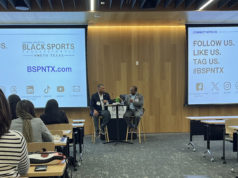The Milwaukee Bucks had concerns about one of their young big men after Friday’s game in Toronto. He hadn’t injured himself in the contest, and, in fact, the 7-footer had actually exceeded his season scoring average that night, contributing eight points in as many minutes. What had the team worried was that they didn’t know if government officials would allow Thon Maker to leave the airport once they landed back home.
Though Maker holds an Australian passport, he was born in a city that at the time of his birth was part of the country of Sudan. While the Bucks had been preparing for their eventual loss to the Raptors, the U.S. president had signed into effect a travel ban affecting “aliens from” Sudan and six other countries. The NBA has asked the State Department for clarification on how the ban might affect its personnel going forward.
The basketball league, like most other high-level sporting organizations, employs players native to many countries. The sports world’s reaction to the executive order seems to skew heavily against it. It strikes me that sport might be a pretty good prism through which to examine the policy.
According to President Trump’s Facebook post on the matter, the directive “is about terror and keeping our country safe.” While one can’t exclude ethical considerations in evaluating the policy, let’s consider for a moment whether it can, in fact, be effective in stopping terrorists.
Is targeting people who hail from a particular country an efficient way of finding bad guys? Sports teams face a similar question as they try to find players good enough to contribute to their organizations.
Efficiency matters in both areas, because resources, even those of a large government or pro sports organization, aren’t unlimited. We live in a world of scarcity. Even if it were morally acceptable, security personnel can’t follow every person in the world around all the time to make sure they’re not getting into mischief. And a baseball team can’t scout every amateur ballgame in the world, either. So you have to find ways to narrow your search.

We can pretty much assume that any good professional hitter probably played baseball in high school. It’s a characteristic they have in common. The problem is that they share that attribute with thousands of other players who will never play an inning in pro ball. So a personnel man or woman has to find other criteria through which to evaluate prospects. If you spend all your time just signing a bunch of schoolboy hitters, you’ve improved your chances of finding a star by a negligible amount over random chance. You have to find other means to improve the odds of finding that elusive All-Star, so you also look at walk rate, quality of competition, work habits, power potential, and a host of advanced statistical and scouting methodologies.
The same would be true in trying to find the elusive terrorist. Let’s say the data show that a number of people predisposed to attack the American homeland have come from the countries affected by the travel ban. The stats I’ve read don’t appear to indicate that, but perhaps classified information the public can’t see does indicate such a pattern. Is country of origin by itself useful enough to justify utilizing it as the lead factor you have your security personnel spend their time screening for? Because the suspects share that characteristic with an enormous number of people (million/billions) who have no intention of committing violence, there might be a really good chance that it’s too broad a category to be of much use. Would those security personnel be better deployed looking for deeper information that truly provides real insight into how to detect those with malicious intent? Forbes quoted Trump son-in-law and campaign operative Jared Kushner as saying “We played Moneyball, asking ourselves which states will get the best ROI for the electoral vote” in winning the election. Might the same baseball-inspired approach prove as effective at finding jihadists as it did voters?
Such an approach would have implications beyond mere return on investment, certainly. As I noted in my MLK Day column, sports has proven really good at judging people based on their individual characteristics, especially since Jackie Robinson’s debut in 1947. Sports teams have made themselves better and spread goodwill across the globe by expanding on that approach to include players from all over. Trump played sports in high school and once owned a football team. He should understand the dynamic.

The maxim that a person should be suspected of a specific crime before the authorities disrupt his or her life traces its roots to the very beginnings of the country. Thon Maker wasn’t considered a threat to national security and was allowed back in the country after his game in Toronto. His relative fame and his job might have helped him, because we can be pretty sure Maker was thoroughly vetted prior to last year’s draft by a highly sophisticated evaluation process. It’s an approach the administration should consider.












